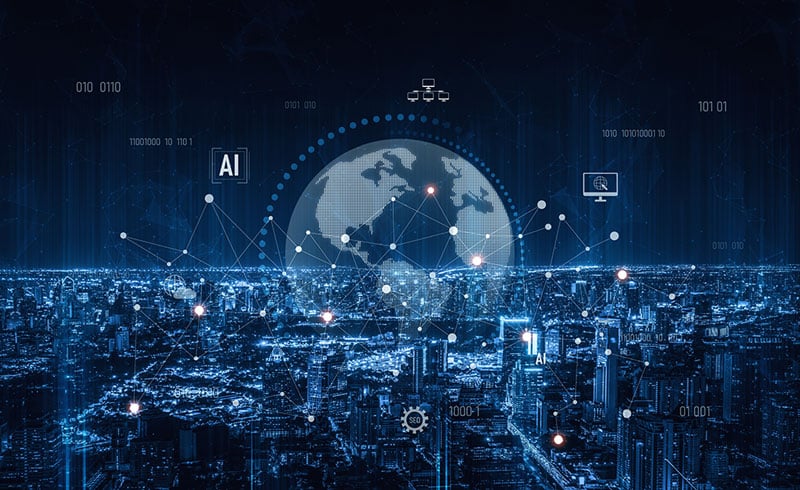- 2026-Feb-17
Unlocking Sustainability with Circularity
Written by Vijay Karna 14 May, 2024
In an era marked by rapid technological advancement and increasing environmental concerns, the concept of a circular economy has gained significant traction. The traditional linear economic model of “take, make, dispose” is proving unsustainable, resulting in resource depletion, environmental degradation, and escalating waste generation. The circular economy offers an alternative approach—one that emphasizes resource efficiency, longevity, and closed-loop systems.
At Cyient, we recognize the urgent need for sustainable solutions. Our joint consulting and engineering practice, “Design for Circularity,” co-developed with eolos, focuses on reimagining products, processes, and solutions to ensure minimal waste and optimized resource utilization. Let’s explore how Cyient contributes to the circular economy:
Traceability—Connecting the Dots
- Problem: Lack of transparency along the value chain hinders sustainable decision-making.
- Solution: Cyient consolidates data from manufactured products, providing transparency to stakeholders. By tracking materials, components, and processes, we enable informed choices and compliance with regulations. Given below is the sample data for a client
- Waste Reduction Figures: By analyzing production data, Cyient has helped reduce waste by 15% year-on-year through optimized processes and material utilization.
- Real-time Reporting: The system provides real-time reporting features, which have improved decision-making speed for stakeholders by 40%, enhancing operational responsiveness.
Material Engineering and Packaging Redesign
- Problem: Unsustainable materials contribute to waste and environmental harm.
- Solution: Cyient goes back to the start of the product value chain. By rethinking material selection, we design for safety and sustainability. Durable, recyclable, and eco-friendly materials are key. Given below is the sample data for a client
- Lifecycle Analysis: Cyient conducts lifecycle analyses on all new products to ensure they are durable and have minimal environmental impact over their entire lifespan.
- Recycling Program Metrics: Through established recycling programs, Cyient recycles 80% of the industrial waste generated during production.
Obsolescence Management
- Problem: Obsolescence disrupts product lifecycles and increases costs.
- Solution: Cyient’s proactive obsolescence management minimizes impact. From initial design to in-service support, we ensure longevity and reduce waste. Given below is the sample data for a client
- Component Standardization: By standardizing 40% of components across multiple product lines, Cyient ensures easier maintenance and longer service life, minimizing the need for frequent updates.
- Waste Reduction Targets: Cyient has achieved a 30% reduction in production waste through better materials management and product design focused on reusability and recycling.
Rethinking the Supply Chain
- Problem: Linear supply chains often fall short of sustainability standards.
- Solution: Cyient collaborates with partners to create robust, circular supply chains. Sustainable sourcing, efficient logistics, and waste reduction are integral to our approach. Given below is the sample data for a client
- Partnership Diversity: Cyient collaborates with over 50 global suppliers committed to sustainability, ensuring diverse and resilient supply chain sourcing.
- Logistics Optimization: Cyient has implemented an AI-driven logistics system that has improved delivery efficiency by 25%, reducing carbon footprint and operational costs.
Cyient in Action
Let’s explore real-world examples of how Cyient contributes to the circular economy:
- Rail industry: Cyient collaborates with rail operators to enhance asset management. By extending the lifespan of rail components through refurbishment and remanufacturing, we reduce waste and promote resource efficiency.
- Automotive sector: Cyient supports automakers in designing modular components that can be easily disassembled, repaired, and upgraded. This approach extends product life and reduces the environmental impact of vehicle manufacturing.
- Aerospace innovations: Cyient pioneers lightweight materials, additive manufacturing, and end-of-life strategies for aircraft components. Our focus on circular design principles ensures sustainable aviation practices.
Toward a Circular Tomorrow
Cyient’s commitment to circularity aligns with global efforts to combat climate change and foster sustainable development. By leveraging technology, data, and collaboration, we contribute to a more planet-friendly, zero-waste future.
Disclaimer: This blog is an independent perspective based on publicly available information and does not constitute official statements from Cyient or eolos.
About the Author
Vijay is Sustainability Reporting Practitioner and Digital Transformation Consultant at Cyient. He helps clients realize business value with expertise in designing business processes to improve customer experience, increase profitability, and provide a competitive edge. He has extensive experience leading circularity and implementing digital readiness on sustainable business models, product and service portfolios, market and customer access, value chains and processes, IT architecture, compliance, organization, and culture.
.png?width=774&height=812&name=Master%20final%201%20(1).png)




